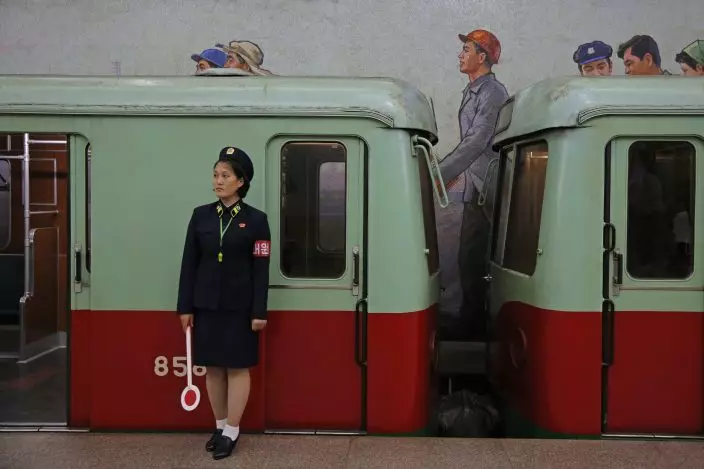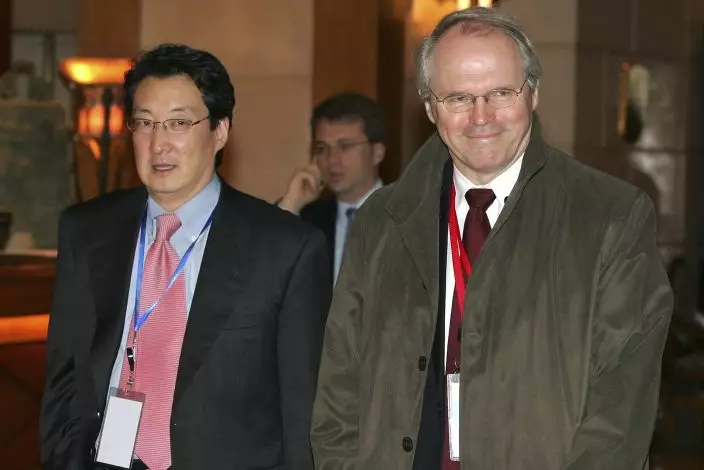Beware of humor gone awry. Don't be afraid to show emotion. Watch those offhanded one-liners.
At the negotiating table, it can be difficult to get North Korean negotiators off their scripted talking points. Sometimes deals are best sealed while on a Pyongyang subway ride, a stroll outside or even during fits of anger.
No matter what President Donald Trump and North Korea's Kim Jong Un may agree to at their Vietnam summit this coming week, the follow-up to those talks will require the kind of laborious discussions that have marked four major sets of negotiating sessions between the two sides over the past quarter-century.

In this Sept. 13, 2018, file photo, a North Korean subway officer stands next to a train in a subway station in Pyongyang, North Korea. At the negotiating table, it can be difficult to get the North Koreans off their scripted talking points. (AP PhotoKin Cheung, file)
Former U.S. diplomats who have spent years in such talks say their North Korean counterparts are always prepared and keen to sniff out anything that seems like a U.S. precondition. They say the North Koreans can launch into anti-American diatribes one minute, then courteously agree to concessions — once they're certain they've gotten all they can.
Bob Carlin, who took part in talks during the Clinton administration, recalled that at the end of one particularly difficult day of negotiations, the chief North Korean balked at one item that had been agreed upon earlier.
"I popped my cork," Carlin said. "This was not an act. I was so angry that he would do this to me."

FILE - In this March 22, 2007, file photo, U.S. Assistant Secretary of State Christopher Hill, right, walks through a hotel lobby with Victor Cha, the U.S. National Security Council's director for Asian Affairs, before heading to six-party talks on North Korea's nuclear program, in Beijing. At the negotiating table, it can be difficult to get the North Koreans off their scripted talking points. (AP PhotoGreg Baker, File)
When the North Korean saw Carlin's flash of anger, he quickly backed down and agreed to what had already been negotiated. The North Korean negotiator apparently just wanted to be able to go back to his superiors and say that he had pushed the Americans as far as he could.
"I learned something important," Carlin said. "If they really go over the line and make me mad, don't sit back and try to be nice. Let them know because they don't want things to fall apart."
In another session, it was the lead North Korean negotiator who got miffed. Carlin, who has traveled to North Korea more than 30 times, said one of the U.S. negotiators wondered aloud when North Korea was going to "join the civilized world."
"The temperature in the room dropped below freezing" and the top North Korean scolded the U.S. negotiator, Carlin said. "It's the type of thing that Americans say without thinking and the North Koreans don't accept."
Victor Cha, a U.S. diplomat who helped negotiate a deal with North Korea in the 1990s, said sometimes the Americans want success so badly that they get caught in negotiation traps choreographed by the North Koreans.
"One of their classic negotiation loops is this end-of-war declaration," Cha said. The idea is that the U.S. declares an end to the Korean War, which ended without a peace treaty. Then, the North Koreans demand the U.S. lift sanctions on them because the war is over. "No," Cha said. "The sanctions are on them for proliferation behavior and human rights abuses. They improve those things, then you lift some comparable sanctions."
Former New Mexico Gov. Bill Richardson, who was the U.S. ambassador to the United Nations during the Clinton administration, has been a frequent mediator with North Korea since the 1990s. He has visited at least eight times, sometimes acting independently to seek the release of American detainees.
Richardson said he was talking to a North Korean official on the Pyongyang subway in 1996 when he finally persuaded him to release Evan Hunziker, an American who had illegally entered the communist country by swimming, while drunk, across the Yalu River from China.
"About 75 percent of the talking points are anti-American ranting," Richardson said. "So, you've got to make deals with them outside of the negotiating table — either at a meal, or walking or in the subway as I did with Hunziker."
Richardson said humor works sometimes, but American negotiators need to use it carefully. As a joke, Richardson said he once inquired about Hunziker's condition in detention, specifically if he still "had his fingernails."
"I started smiling," Richardson said. "The North Korean looked at me. I thought he was going to kill me. And then he started laughing. They're not used to humor. They're very formal."
On the flip side, Richardson said it was he who didn't know whether the North Koreans were joking when they asked to be reimbursed for the cost of ammunition they used to shoot at an American helicopter pilot in 1994.
Army pilot Bobby Hall's helicopter was hit by North Korean air defenses after he strayed across the border, forcing him into an emergency landing. His co-pilot later died from his injuries.
"They said 'Your pilot violated North Korean air space and so we had to shoot it down and you have to pay for it,'" Richardson said. "I said 'I'm not going to do that. That's ridiculous.' But they were very serious."
Stephen Biegun, the Trump administration's point man on North Korea, said the United States is trying to find better ways to talk with its North Korean counterparts.
"I am not kidding when I say it is difficult for us to communicate with each other," Biegun said in a recent speech at Stanford University.
"We are located in very different parts of the world with very different histories. We have dramatically different views on individual rights and on human rights. ... We also have no trade of any sort, no diplomatic relations and virtually no ability to communicate directly with one another."
Despite that, the two sides for months have been engaged in talks and exchanging letters — messages of trust and confidence to lubricate the process.
Trump has been effusive about his exchanges from Kim.
He told a political rally in West Virginia last fall: "He wrote me beautiful letters and they're great letters. We fell in love."
Follow all of AP's summit coverage at https://apnews.com/Trump-KimSummit










